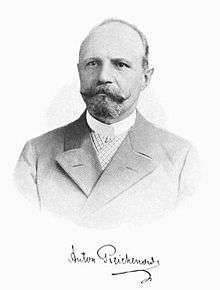Anton Reichenow

Anton Reichenow (August 1, 1847 in Charlottenburg – July 6, 1941 in Hamburg) was a German ornithologist and herpetologist.
Reichenow was the son-in-law of Jean Cabanis, and worked at the Humboldt Museum from 1874 to 1921. He was an expert on African birds, making a collecting expedition to West Africa in 1872 and 1873, and writing Die Vögel Afrikas (1900–05). He was also an expert on parrots, describing all species then known in his book Vogelbilder aus Fernen Zonen: Abbildungen und Beschreibungen der Papageien (illustrated by Gustav Mützel, 1839–1893). He also wrote Die Vögel der Bismarckinseln (1899). He was editor of the Journal für Ornithologie from 1894 to 1921.
A number of birds are named after him, including Reichenow's woodpecker and Reichenow's firefinch. His son Eduard Reichenow was a famous protozoologist.
Reichenow is known for his classification of birds into six groups, described as "shortwings, swimmers, stiltbirds, skinbills, yoketoes, and treebirds". This system was not adopted by any other ornithologists, but is used in the standard decimal library cataloging system.
Reichenow also worked in the scientific field of herpetology. He is credited with describing a new genus of frogs, two new species of frogs,[1] and two new species of lizards.[2] He is commemorated in the scientific name of a species of skink, Lacertaspis reichenowi.[3]
References
- ↑ Amphibian Species of the World 5.6, an Online Reference. research.amnh.org/vz/herpetology/amphibia.
- ↑ The Reptile Database. www.reptile-database.org.
- ↑ Beolens, Bo; Watkins, Michael; Grayson, Michael (2011). The Eponym Dictionary of Reptiles. Baltimore: Johns Hopkins University Press. xiii + 296 pp. ISBN 978-1-4214-0135-5. ("Reichenow", pp. 218-219).
Further reading
- Beolens, Bo; Watkins, Michael (2003). Whose Bird?: Men and women commemorated in the common names of birds. London: Christopher Helm.
- Walters, Michael (2003). A Concise History of Ornithology. New Haven: Yale University Press. ISBN 0-300-09073-0.
External links
- The Birds: Handbook of Systematic Ornithology. Volume 1
- The Birds: Handbook of Systematic Ornithology. Volume 2
- The Birds of German-East-Africa (1894)
- Die Vögel Afrikas. Volume 1 Volume 2 Volume 3 Atlas
- Conspectus Psittacorum